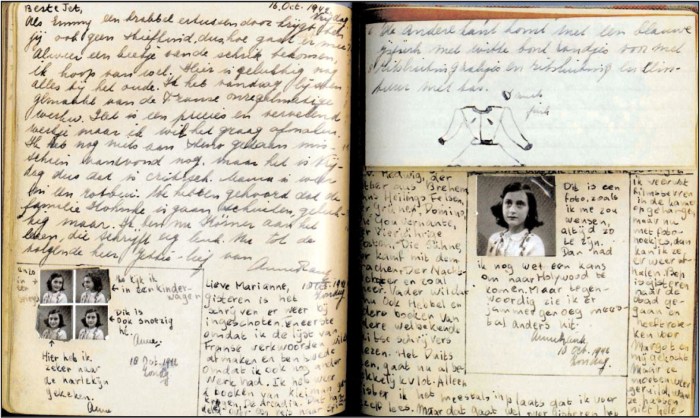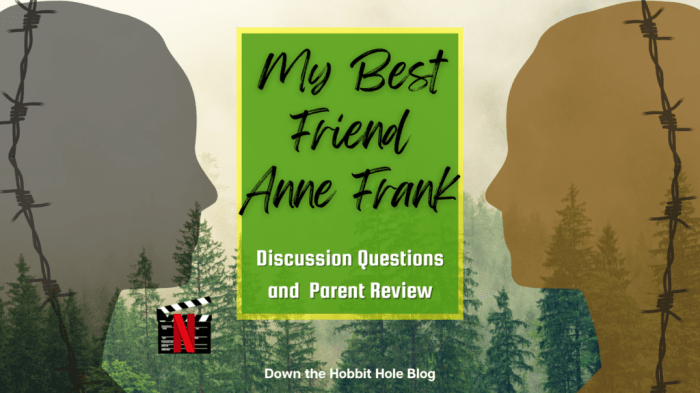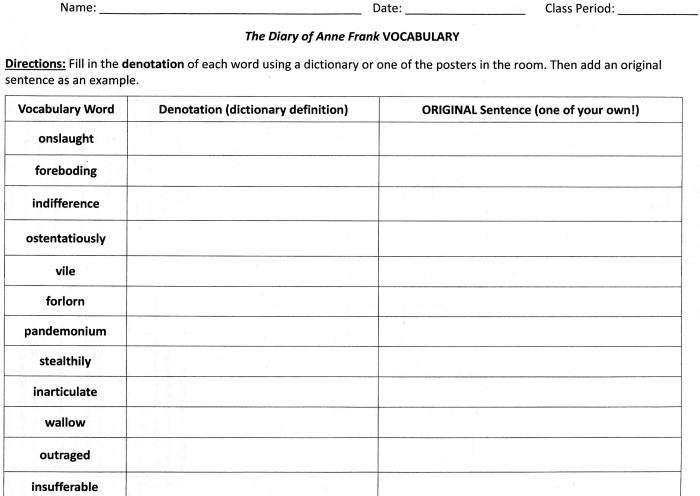Diary of anne frank discussion questions – Anne Frank’s diary, a poignant testament to human resilience and the horrors of war, offers a rich tapestry of insights for contemporary readers. This guide delves into a series of discussion questions that illuminate the historical context, character development, literary techniques, and enduring legacy of this seminal work.
Through these questions, we embark on a journey of exploration, examining Anne Frank’s personal growth, the dynamics within her family, and the profound impact her diary has had on society and culture. We invite you to engage with these questions, fostering a deeper understanding of Anne Frank’s story and its timeless relevance.
Historical Context: Diary Of Anne Frank Discussion Questions

Anne Frank’s diary offers a unique glimpse into the experiences of a Jewish family during the Holocaust. The diary begins in 1942, when Anne and her family are forced into hiding in Amsterdam to escape the Nazi persecution. The diary chronicles Anne’s life in hiding for two years, until the family is discovered and taken to concentration camps.
The Holocaust was a systematic genocide of approximately six million European Jews by Nazi Germany and its collaborators during World War II. The Holocaust began with the invasion of Poland in 1939 and ended with the defeat of Nazi Germany in 1945.
Character Analysis
Anne Frank’s diary reveals a complex and insightful young girl. Anne is intelligent, curious, and full of life. She is also a keen observer of the world around her and is not afraid to express her opinions.
Anne’s relationships with her family members are complex. She is close to her father, Otto, but she often clashes with her mother, Edith. Anne also has a close relationship with her older sister, Margot.
Anne’s diary is a testament to her courage, resilience, and spirit. Despite the horrors she witnesses, Anne never gives up hope. She believes that the world can be a better place and that she will be able to live a full and happy life.
Literary Analysis
Anne Frank’s diary is a powerful and moving work of literature. Anne’s writing is clear, concise, and engaging. She uses a variety of literary techniques, such as symbolism, foreshadowing, and irony, to create a vivid and memorable account of her experiences.
The diary is structured in a series of entries, each of which is dated. Anne’s entries are often reflective and introspective. She writes about her thoughts, feelings, and experiences. She also writes about her hopes and dreams for the future.
Anne’s use of language and imagery is particularly striking. She uses vivid and evocative language to create a sense of place and atmosphere. She also uses imagery to symbolize her experiences and emotions.
Social and Cultural Impact
Anne Frank’s diary has had a profound impact on society and culture. The diary has been translated into more than 70 languages and has sold more than 30 million copies worldwide.
The diary has been used to raise awareness about the Holocaust and to promote tolerance and understanding. The diary has also been used as a teaching tool in schools and universities.
The publication and distribution of Anne Frank’s diary have raised a number of ethical considerations. Some people have argued that the diary should not be published because it is too personal and revealing. Others have argued that the diary is an important historical document that should be shared with the world.
Historical Legacy, Diary of anne frank discussion questions
Anne Frank’s diary is a powerful and enduring legacy. The diary has helped to shape our understanding of the Holocaust and has inspired people around the world to fight against hatred and intolerance.
The diary continues to be relevant in contemporary society. It is a reminder of the dangers of prejudice and discrimination. It is also a reminder of the importance of hope and courage.
Detailed FAQs
What is the significance of the diary’s historical context?
Understanding the historical context of the Holocaust and World War II is crucial for comprehending the events and experiences depicted in Anne Frank’s diary. It provides insights into the persecution of Jewish communities and the broader political and social landscape of the time.
How does Anne Frank’s character evolve throughout the diary?
Anne Frank’s diary offers a unique window into her personal growth and development. As she navigates the challenges of adolescence and the horrors of hiding, readers witness her transformation from a carefree child to a thoughtful and courageous young woman.
What literary techniques does Anne Frank employ in her writing?
Anne Frank’s diary is a literary masterpiece, showcasing her keen observational skills and vivid imagination. She uses symbolism, foreshadowing, and irony to convey the complexities of her experiences and emotions.
What is the impact of Anne Frank’s diary on society and culture?
Anne Frank’s diary has had a profound impact on society and culture, raising awareness about the Holocaust and promoting tolerance and understanding. It has been translated into over 70 languages and has become a symbol of hope and resilience.
What ethical considerations surround the publication and distribution of the diary?
The publication and distribution of Anne Frank’s diary raise important ethical considerations, including the privacy of the individuals mentioned and the potential for sensationalism. However, the diary’s historical and educational value has been deemed to outweigh these concerns.

